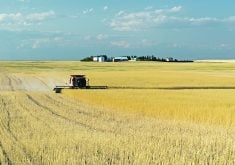What’s the best way to have your children start farming? How do you compensate them?
Many operations pay wages to children or young people working on the farm. This works great when your children are younger. If they aren’t sure about farming in the future, paying wages as a farm employee is simple and transparent.
However, as the younger generation gets more involved in the farming operation, and the long-term plan is that they want to farm, they need independence and experience to start building their equity.
Read Also

High prices see cow-calf producers rushing to incorporate
Farm accountants are reporting a steady stream of cow-calf producers rushing to get their operations incorporated ahead of selling their calves this fall.
There can be a lot of issues when a 30, 40 or even 50-year-old has been working for wages on a parent’s farming operation for years. Without the financial experience, there is a huge learning curve when the operation is passed to the next generation. Without consistently building equity in the farming operation over the years, potentially contentious issues like fair value of wages and sweat equity transfers come into play.
There are several ways for a young farmer to build experience and equity, such as participating in a joint venture as a percentage of the entire farming operation.
However, we typically recommend that a young farmer start their own small farming operation on the side. For a cattle operation, this can be buying a few cows to start a herd. On the grain farming side, renting a quarter of land is a great way to start a small farming operation.
The young farmer should pay for the portion of allowable expenses (fertilizer, chemical, seed, crop insurance and fuel) so that the farming operation is separate for AgriInvest and AgriStability purposes.
To finance the inputs, the young farmer can get crop insurance and use this as security to get an interest-free cash advance on the crop.
For equipment, a trade of labour for equipment can work, where the young farmer provides labour to the farming operation in trade for equipment use. It’s important to document this trade, especially if there are disputes in the future and if non-farming children are looking at the arrangement.
As the young farmer’s involvement grows, ideally the next generation can rent more land and start buying some equipment.
Eventually, the young farmer should buy land, and incorporation will follow as taxes become an issue. The land could be purchased personally and then sold to a corporation after two years, and if the land value goes up, the young farmer can use the tax-free capital gains exemption on the sale to the corporation.
Benefits of this arrangement include:
- Independence — the next generation can have the freedom to experiment with new crops or inputs. It’s a lot less risky to make mistakes and learn on one quarter of land or 10 head of cattle rather than the whole operation.
- Paying your own input bills and deciding on crop and hail insurance options gives a lot of experience in the risk of farming.
- Building separate crop insurance and AgriStability history can be helpful down the road, including the experience of meeting crop insurance deadlines and filings.
- Making your own marketing decisions will develop relationships with buyers as well as understanding marketing options.
- Gaining experience in the tax planning for a grain farm, including understanding deferrals and prebuys and record keeping and GST filing for a farm operation, is useful. A separate farming operation can also help keep the parent’s company below the $500,000 small business deduction low corporate tax rate and the $10 million taxable capital threshold where the small business deduction starts to be lost.
- Managing an AgriInvest account. It’s a lot better to learn the lesson of accidentally missing a $500 matching contribution than a $10,000 matching contribution.
- Understanding how crop advances and input loans work and how to repay them.
- Building a credit history. Developing relationships with lenders and a financial history is useful when taking on debt in the future.
- The goal is to build equity in land and a farming operation, independent of parents. It’s problematic when parents build a large operation based on the child’s work, only to have it split with non-farming children.
- When it is time to take on the parent’s farming operation, ideally the farming child will have a track record of running their own operation with the experience to pull it off.
The downside of a separate farming operation is that it can be a hassle to run from a bookkeeping and management perspective. That is why we don’t recommend this arrangement for children or workers who aren’t sure if farming is their long-term plan.
For a young farmer, starting small and building experience and equity is invaluable.
Levi Derksen, CPA, CGA, is a senior manager in the Ag Team at Buckberger Baerg & Partners LLP in Saskatoon. He can be contacted at lderksen@bbllp.ca.















